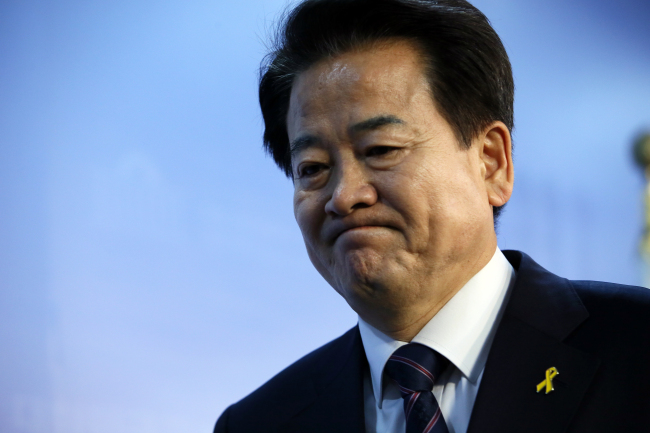Former liberal presidential candidate Chung Dong-young on Sunday announced his exit from the main opposition New Politics Alliance for Democracy to create a new party.
“After careful consideration, I’ve decided to leave the NPAD to join the effort to create a new political party,” Chung said in a press conference.
The chief adviser to the NPAD said he would take part in the creation of a new political force pushed by democratic and progressive blocs, stressing that it reflects the demand of the people.
Preparation for the new party is being led by a group of left-leaning people from various factions of society, such as education, religious and labor circles.
As of now, 105 people have joined the group to create a new progressive party ahead of the April elections. The three-time lawmaker said he sympathizes with the group’s ideals to “pursue a reasonable progressive politics and to create a country based on peace, protection of environment and welfare.”
Five former lawmakers plan to join the group, and former four-term NPAD lawmaker Chun Jung-bae is reportedly mulling whether to follow suit.
Chung’s exit is likely to deal a heavy blow to the NPAD, which is slated to elect its new leader on Feb. 8. Moments after his defection, the party expressed regret over Chung’s decision.

Former liberal presidential candidate Chung Dong-young walks out of the National Assembly press conference room Sunday after announcing that he would leave the New Politics Alliance for Democracy. (Yonhap)
“It is very regretful that Chung, who had been our party’s presidential candidate, left us. I think people would have expected us to cooperate under the new leadership,” said Rep. Han Jeong-ae, a spokesperson for the NPAD.
Park Jie-won, one of three candidates for the NPAD leadership, also said he was “deeply sorry” Chung had to leave. “His departure made me think the factional feud (within the party) may have been too much,” he said.
Moon Jae-in, another candidate for the NPAD leadership, said Chung should have stayed to work out the issues rather than to leave the party. “If by any chance, our party was not as progressive as he (Chung) felt was necessary, he should have made efforts within the NPAD to lead us.”
Shin Yul, a political professor at Myongji University, said Chung’s defection may have resulted from the fear that his political career may have no future within the NPAD. But he expressed doubts that many incumbent lawmakers would follow Chung’s footsteps to join the new party.
“In most cases, the lawmakers (within the NPAD) likely to leave the party are ones opposing the pro-Roh faction. But most of them are either centralists or moderates who are unlikely to join forces with progressives,” said Shin.
Other observers raised the possibility that prominent centralists, such as NPAD lawmakers concerned about the growing prominence of the pro-Roh faction ― namely Rep. Moon ― could join the new party, they said.
Chung, a 61-year-old former journalist, entered politics in 1996 when he was elected as a member of the Korean parliament.
He served as a unification minister for almost two years in the Roh Moo-hyun administration, and was the liberal bloc’s front-line candidate in the 2007 presidential election. Chung’s campaign, however, ended unsuccessfully to former President Lee Myung-bak by the widest margin since direct elections began in 1987.
By Yoon Min-sik (
minsikyoon@heraldcorp.com)






![[KH Explains] No more 'Michael' at Kakao Games](http://res.heraldm.com/phpwas/restmb_idxmake.php?idx=645&simg=/content/image/2024/04/28/20240428050183_0.jpg&u=20240428180321)